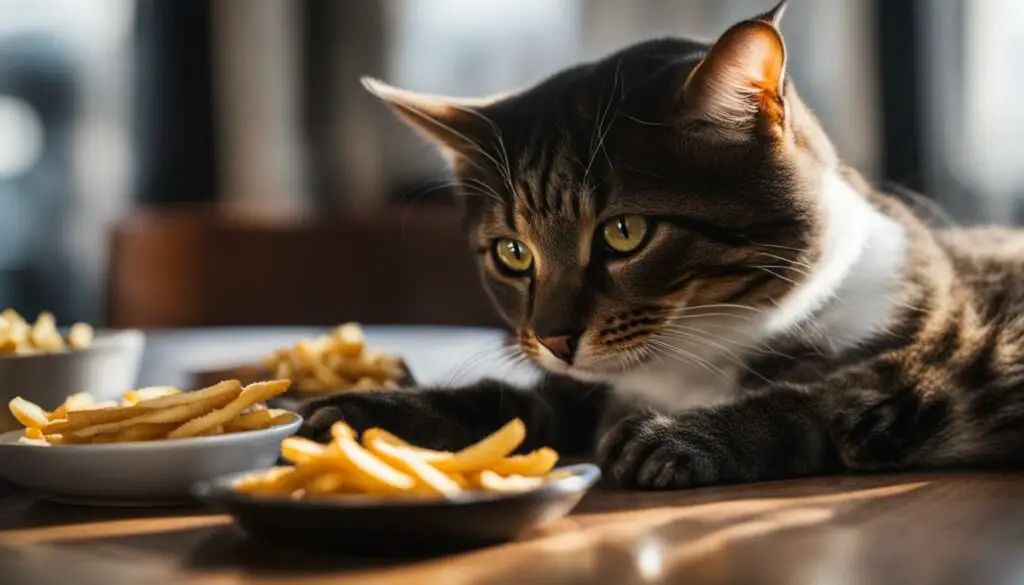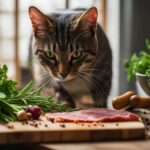French fries can be a tempting snack for cats, but it’s important to understand the potential risks and concerns associated with this indulgence. While cooked french fries are generally non-toxic to cats, they offer little to no nutritional benefit and can contribute to health issues such as weight gain and digestive upset. It’s always best to prioritize a balanced and species-appropriate diet for your cat.
Key Takeaways:
- Cooked french fries are generally non-toxic to cats, but offer little to no nutritional benefit.
- Prioritize a balanced and species-appropriate diet for your cat’s overall health.
- Avoid feeding your cat raw potatoes or large amounts of cooked fries to prevent potential toxicity.
- The high sodium, fat, and carbohydrate content of french fries can contribute to health issues in cats.
- Certain flavorings and additives in french fries can be harmful to cats, so it’s important to read ingredient labels.
Are French Fries Poisonous for My Cat?
French fries can be a tempting snack for cats, but it’s important to understand the potential risks and concerns associated with this indulgence. While cooked french fries are generally non-toxic to cats, they offer little to no nutritional benefit and can contribute to health issues such as weight gain and digestive upset. It’s always best to prioritize a balanced and species-appropriate diet for your cat.
The toxicity of French fries for cats depends on their preparation. Raw potatoes, which are used to make French fries, contain alkaloids that can be harmful to cats if consumed in large quantities. These alkaloids are found in all parts of the potato plant, including the tubers, stems, and leaves. However, once the potatoes are cooked, the alkaloids are reduced to safe levels. While an occasional cooked French fry is unlikely to cause harm, it’s important to avoid feeding your cat raw potatoes or large amounts of cooked fries.
To ensure your cat’s safety, it’s crucial to be aware of other toxic foods for cats as well. Onions and garlic, for example, contain substances that can cause anemia in cats. It’s best to keep your cat’s diet free from these ingredients and consult with a veterinarian if you suspect your cat has ingested something harmful.
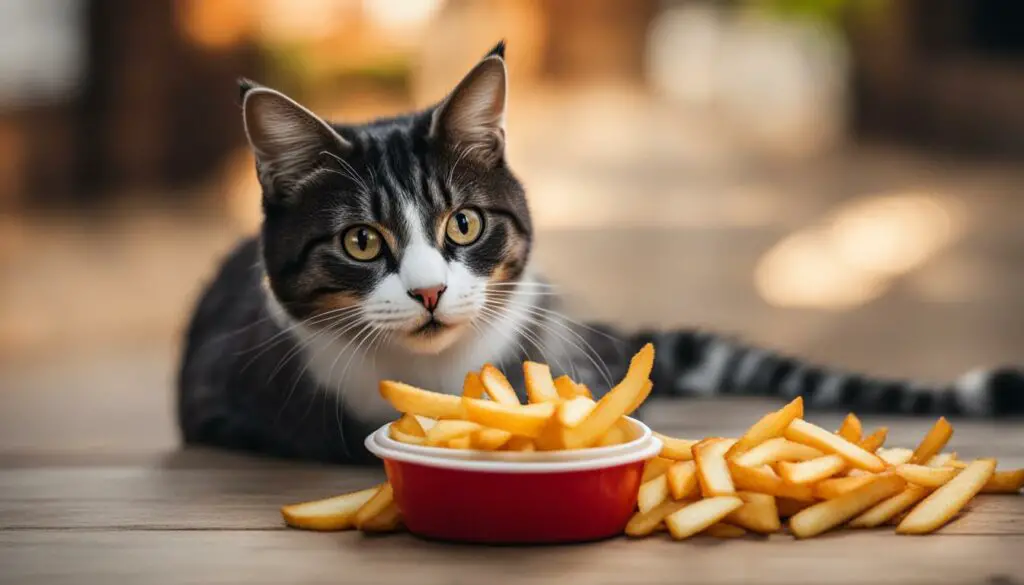
In summary, while French fries may not be directly poisonous to cats, they offer little nutritional value and can potentially cause health issues if consumed in large quantities. Raw potatoes and certain flavorings should be avoided, as they can be toxic to cats. It’s always recommended to prioritize a balanced and species-appropriate diet for your feline friend to ensure their overall well-being.
Interesting Facts About French Fries
French fries are a beloved snack enjoyed by people all over the world, but did you know that their origin is shrouded in mystery? Various countries claim to be the birthplace of French fries, including France, Spain, and Belgium. However, it is widely believed that Thomas Jefferson, the third president of the United States, introduced French fries to the country.
For those who are intrigued by the history and culture surrounding French fries, a visit to the Frietmuseum in Bruges, Belgium, is a must. This unique museum is dedicated to the fascinating story of fries, from their humble beginnings to their global popularity today. It offers visitors a chance to learn about the different types of potatoes used, the various cooking techniques, and the different sauces and toppings that can accompany this crispy treat.
French fries have a rich history and have become a staple in many cuisines around the world. Whether you enjoy them as a snack or a side dish, their crispy texture and delicious flavor make them hard to resist.
The Origins of French Fries
The exact origin of French fries continues to be debated, with different countries claiming to have invented this beloved snack. The popular belief is that French fries were first introduced to the United States by Thomas Jefferson, who encountered them during his time in France. However, it is important to note that the name “French fries” itself is a misnomer, as they are not exclusively French.
The Frietmuseum in Bruges, Belgium, aims to unravel the mystery behind the origins of French fries. This unique museum takes visitors on a journey through the history of potatoes and fries, exploring their cultivation, preparation, and cultural significance. From traditional Belgian fry stands to global fast-food chains, the Frietmuseum showcases the evolution of fries and their role in our culinary heritage.
So, the next time you enjoy a plate of crispy, golden French fries, take a moment to appreciate the fascinating history and global influence behind this beloved snack.
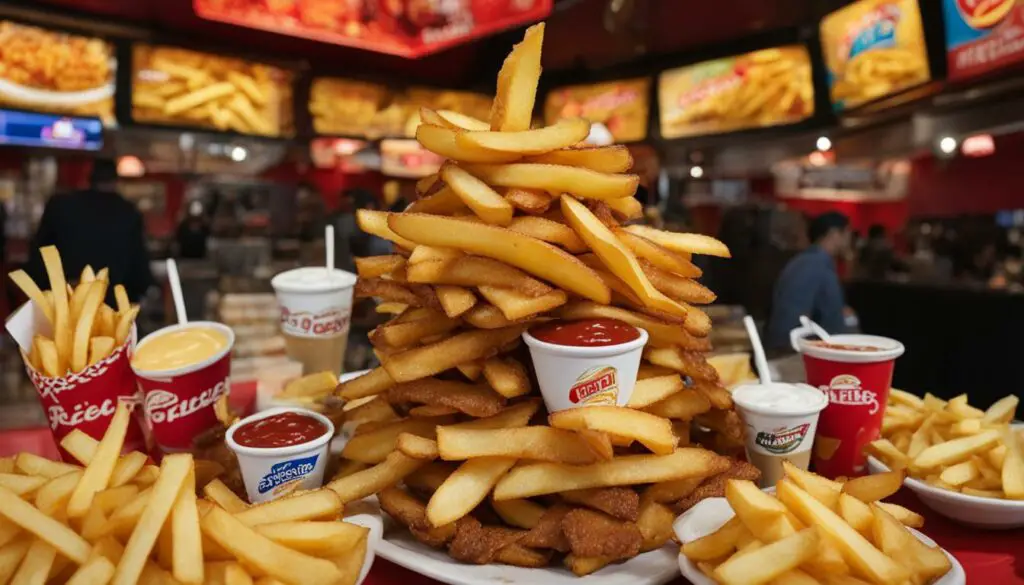
A Visit to the Frietmuseum
If you’re a fan of French fries and want to delve deeper into their history, a visit to the Frietmuseum in Bruges, Belgium, is a must-do. This dedicated museum explores the origins, preparation methods, and cultural impact of this world-famous snack.
Located in a historic building in the heart of Bruges, the Frietmuseum offers a unique experience for fry enthusiasts of all ages. The museum’s exhibits showcase the different varieties of potatoes used to make fries, the evolution of frying techniques, and the influence of fries in popular culture.
Visitors can also learn about the different sauces and toppings that can be enjoyed with fries, from classic ketchup to Belgian specialties like mayonnaise and tartare sauce. The museum even offers the chance to taste freshly made fries in its own fry shop, ensuring a truly immersive experience.
So, if you find yourself in Bruges, don’t miss the opportunity to explore the fascinating world of fries at the Frietmuseum. It’s a treat for the senses and a journey through the history and culture of this beloved snack.
What Do French Fries Contain?
French fries typically contain potatoes, oil for frying, salt, and various seasonings. The main ingredient, potatoes, provide carbohydrates, fiber, potassium, manganese, and vitamins C and B6. However, it’s important to note that cats are obligate carnivores and do not require carbohydrates in their diet.
While homemade fries can be made with just potatoes, oil, and seasoning of your choice, commercially prepared fries may have additional ingredients. These can include preservatives, flavor enhancers, and other additives to enhance taste and texture. It’s crucial to read ingredient labels and be aware of any potential allergens or harmful additives that may be present in pre-packaged fries.
It’s worth noting that while potatoes themselves are generally safe for cats when cooked, certain flavorings commonly found on French fries can be harmful. Ingredients like onion and garlic powder, often used in seasonings or condiments, are toxic to cats and should be avoided.
| Ingredients in French Fries | Nutritional Value |
|---|---|
| Potatoes | Carbohydrates, fiber, potassium, manganese, vitamins C and B6 |
| Oil for frying | High in fat and calories |
| Salt | High sodium content |
| Various seasonings and flavorings | Varies depending on the specific ingredients used |
| Additives in commercially prepared fries | May include preservatives, flavor enhancers, and other additives |
It’s best to prioritize a balanced and species-appropriate diet for your cat, focusing on high-quality animal proteins and avoiding unnecessary carbohydrates and additives.
Can Cats Eat Uncooked French Fries?
Cats should not eat uncooked french fries or raw potatoes. Raw potatoes contain alkaloids, including solanine, that can be toxic to cats. The green parts of the potato, such as the sprouts or skin, are particularly high in alkaloid content. If your cat consumes raw potatoes or exhibits symptoms such as vomiting, diarrhea, weakness, or changes in heart rate, it’s essential to seek veterinary attention. The Pet Poison Helpline and ASPCA provide resources on the potential toxicity of raw potatoes for pets.
“Cats should not eat raw potatoes or uncooked french fries due to their potential toxicity.”
According to the Pet Poison Helpline, raw potatoes contain solanine, a toxic substance that can cause vomiting, diarrhea, and even cardiac arrhythmias in cats. The ASPCA advises against feeding cats raw potatoes or uncooked foods containing potatoes. If you suspect your cat has ingested raw potatoes or is showing signs of toxicity, it’s crucial to contact your veterinarian or an animal poison control center immediately.
| Signs of Raw Potato Toxicity in Cats | Actions to Take |
|---|---|
| Vomiting | Contact your veterinarian or animal poison control center |
| Diarrhea | Seek immediate veterinary attention |
| Weakness | Do not induce vomiting without professional guidance |
| Changes in heart rate | Follow the advice of your veterinarian or animal poison control center |
Why are raw potatoes toxic to cats?
“Raw potatoes contain solanine, a toxic substance that can cause digestive upset and cardiac issues in cats.”
Raw potatoes contain alkaloids, specifically solanine, that can be harmful to cats. Alkaloids are naturally occurring compounds in plants and can vary in toxicity. The concentration of solanine is higher in the green parts of the potato, such as sprouts and skin, making them more dangerous for cats. Cooking potatoes reduces the alkaloid content to safe levels, which is why cooked french fries pose less risk to cats compared to raw potatoes.
In summary, cats should not consume uncooked french fries or raw potatoes due to the potential toxicity of alkaloids like solanine. If you suspect your cat has ingested raw potatoes or is showing signs of toxicity, it’s important to contact your veterinarian or an animal poison control center for guidance and appropriate medical care.
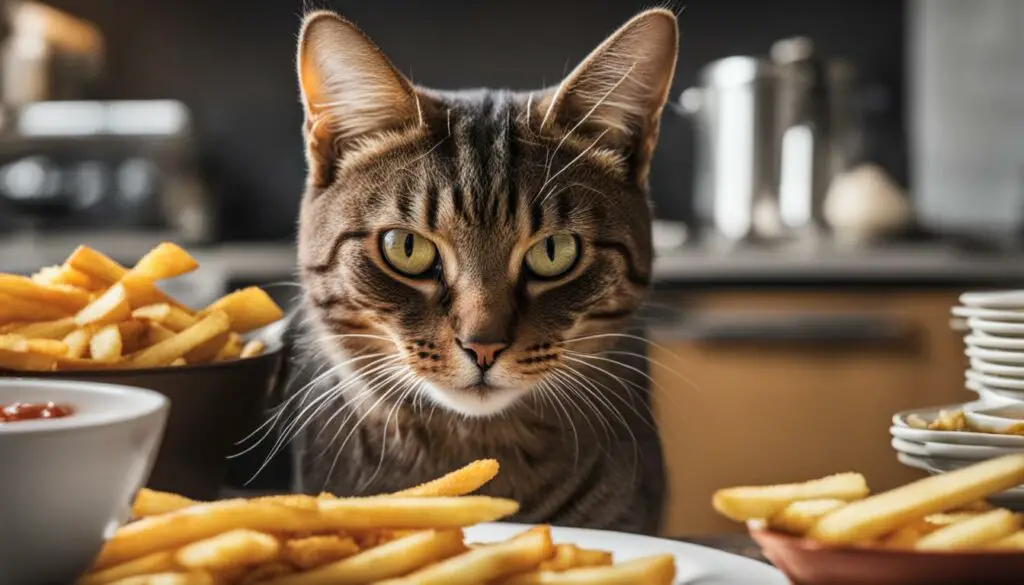
Can Cats Eat Cooked French Fries?
When it comes to sharing our favorite snacks with our feline companions, it’s essential to consider their nutritional needs and potential health risks. While cooked French fries may seem harmless, there are certain factors to keep in mind.
One of the main concerns with feeding cats cooked French fries is the high sodium and fat content. These ingredients can be detrimental to a cat’s health, especially if they have underlying health conditions such as obesity or heart disease. Additionally, the carbohydrates present in fries are not necessary for a cat’s diet and can contribute to weight gain.
While an occasional cooked French fry may not cause immediate harm, it’s crucial to prioritize a balanced and species-appropriate diet for your cat. This means focusing on high-quality animal protein sources and avoiding unnecessary additives and carbohydrates. Consult with your veterinarian for specific dietary recommendations tailored to your cat’s individual needs.
| Health Risks of Cooked French Fries for Cats | Sodium and Fat in Fries | Carbohydrates and Cats |
|---|---|---|
| Elevated sodium and fat content can be detrimental to a cat’s health, particularly for those with underlying conditions. | The high levels of sodium and fat present in fries can contribute to obesity, heart disease, and other health issues. | The carbohydrates present in fries are not necessary for a cat’s diet and can lead to weight gain if consumed in excess. |
| It’s best to prioritize a balanced and species-appropriate diet for your cat, focusing on high-quality animal proteins. | Offering healthier alternatives, such as lean meats or freeze-dried treats, can provide a more nutritious snack option for your cat. | Consult with your veterinarian for specific dietary recommendations tailored to your cat’s individual needs. |
Extra Flavorings
When it comes to French fries, additional flavorings such as sauces and seasonings can be tempting to try. However, it’s important to be cautious when it comes to sharing these flavorings with your cat. Many sauces and seasonings can be acidic, which can cause irritation to a cat’s digestive system and potentially lead to gastrointestinal issues. It’s best to avoid giving your cat French fries with these added extras.
Furthermore, some common flavorings like onion and garlic can be toxic to cats. These ingredients contain compounds that can cause anemia and may require veterinary treatment if ingested in significant amounts. It’s crucial to read ingredient labels and avoid sharing foods with potentially harmful additives with your cat.
“Cats should not consume foods with onion or garlic as these ingredients can be toxic to their health,” says Dr. Emily Smith, a veterinarian.
Ingredients to Avoid
When it comes to sharing food with your cat, it’s important to be aware of ingredients that can be harmful to their health. In addition to avoiding onion and garlic, there are other ingredients to be cautious about. Some common seasonings like salt and artificial flavors may not be suitable for cats. The excess sodium in salt can be detrimental to their health, especially if they have underlying health conditions. Artificial flavors may contain additives that can cause digestive upset or allergic reactions.
“It’s best to stick to a balanced and species-appropriate diet for your cat, avoiding unnecessary additives and seasonings,” suggests Dr. Sarah Johnson, a feline nutrition specialist.
| Ingredients to Avoid | Potential Harm |
|---|---|
| Onion and Garlic | Toxicity, potential anemia |
| Salt | Excess sodium, harmful for cats with health conditions |
| Artificial flavors | Potential digestive upset, allergic reactions |
By being aware of these ingredients and their potential risks, you can ensure that your cat’s diet remains safe and healthy. It’s always best to consult with your veterinarian for specific dietary recommendations tailored to your cat’s individual needs.
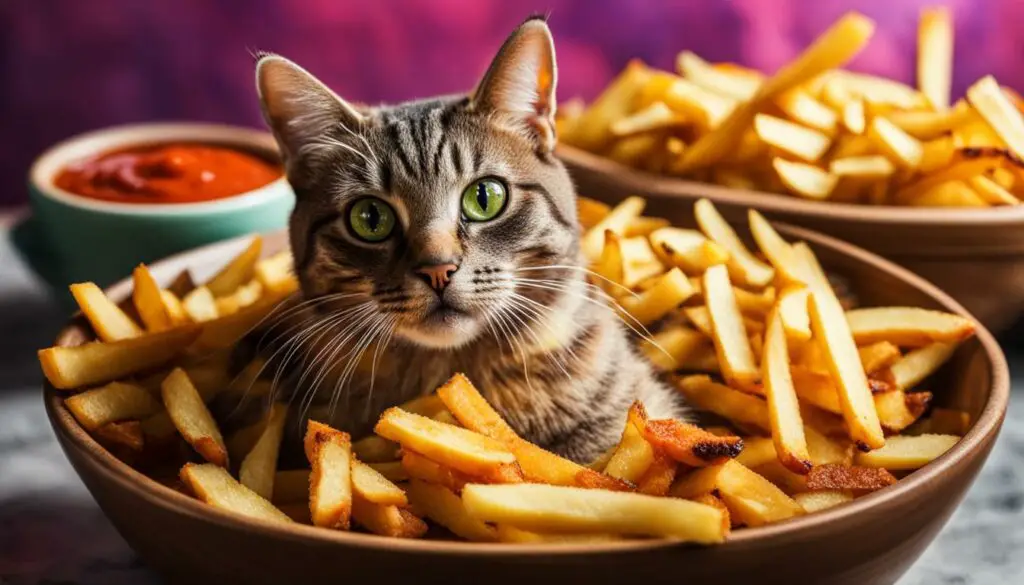
Learning about What Your Cat Can and Cannot Eat
As a responsible cat owner, it’s crucial to understand what foods are safe and appropriate for your furry friend. Cats have specific dietary needs as obligate carnivores, and providing them with a balanced and species-appropriate diet is essential for their health and well-being.
When it comes to cat diet and food restrictions, it’s important to prioritize high-quality animal protein sources. Cats require nutrients such as taurine, arginine, and essential fatty acids, which are abundant in meat-based diets. Commercially available cat foods formulated by reputable brands often meet these nutrient requirements.
To ensure a positive dining experience for your cat, consider investing in a suitable cat bowl. The Hepper NomNom Cat Bowl is an innovative choice known for its whisker relief and digestion benefits. This bowl design prevents whisker stress, providing your cat with a comfortable feeding experience. Additionally, its shallow and wide shape helps prevent cats from pushing food out of the bowl, reducing mess and waste.
In conclusion, learning about what your cat can and cannot eat is vital for their overall health. Focus on providing a species-appropriate diet that prioritizes high-quality animal proteins. Consult with your veterinarian for specific dietary recommendations tailored to your cat’s individual needs. By understanding and meeting your cat’s nutritional requirements, you can ensure they live a long, happy, and healthy life.
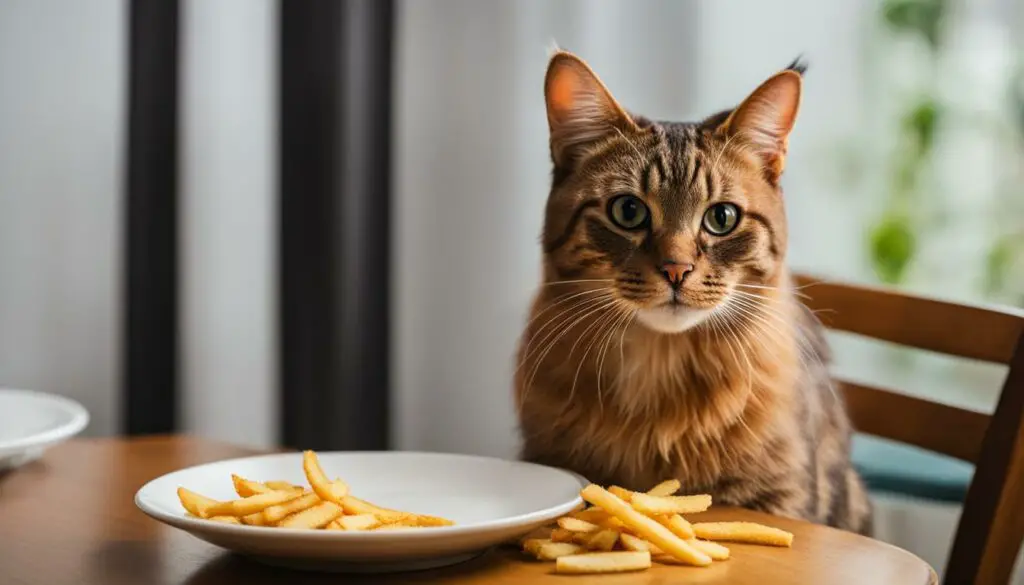
Frequently Asked Questions
- Can I feed my cat homemade meals?
- Can cats eat fruits and vegetables?
- Are there any foods cats should never eat?
- How can I transition my cat to a new diet?
While homemade meals can be an option, it’s important to ensure they meet your cat’s nutritional needs. Consult with a veterinarian or a veterinary nutritionist to create balanced homemade recipes for your cat.
Cats are obligate carnivores and primarily require animal-based proteins. While small amounts of certain fruits and vegetables can be safe for cats, always research and consult with your veterinarian before introducing new foods to your cat’s diet.
Yes, some foods are toxic to cats and should be strictly avoided. These include chocolate, caffeine, alcohol, onions, garlic, grapes, raisins, and xylitol (a sweetener commonly found in sugar-free products).
Gradual transitions are recommended to avoid digestive upset. Mix small amounts of the new food with your cat’s current food, gradually increasing the proportion of the new food over a week or two.
| Cats Can Eat | Cats Should Avoid |
|---|---|
| Chicken | Chocolate |
| Turkey | Caffeine |
| Fish (cooked) | Alcohol |
| Beef | Onions |
| Lamb | Grapes |
| Pork | Raisins |
Conclusion
In conclusion, while it may be tempting to share a few french fries with your cat, it’s important to consider the risks and potential harm that it can cause. Feeding cats french fries is not recommended due to their low nutritional value and potential health issues. Cats are obligate carnivores, meaning they require a diet rich in animal proteins and lack the ability to efficiently digest carbohydrates.
Feeding cats french fries can lead to weight gain, digestive upset, and even potential poisoning if the fries are uncooked or contain harmful seasonings like onion and garlic. It’s always best to prioritize a species-appropriate diet for your cat, focusing on high-quality animal proteins and avoiding unnecessary additives.
Consulting with your veterinarian can provide you with specific dietary recommendations for your cat’s individual needs. They can guide you in choosing the right cat food that meets all the necessary nutritional requirements. Remember, the health and well-being of your furry friend should always be the top priority when it comes to their diet.
FAQ
Can cats eat French fries?
While cooked French fries are generally non-toxic to cats, they offer little to no nutritional benefit and can contribute to health issues such as weight gain and digestive upset. It’s best to prioritize a balanced and species-appropriate diet for your cat.
Are French fries poisonous for my cat?
The toxicity of French fries for cats depends on their preparation. Raw potatoes, which are used to make French fries, contain alkaloids that can be harmful to cats if consumed in large quantities. However, once the potatoes are cooked, the alkaloids are reduced to safe levels. It’s important to avoid feeding your cat raw potatoes or large amounts of cooked fries.
What are some interesting facts about French fries?
French fries have a mysterious origin, with various countries, including France, Spain, and Belgium, claiming to be their birthplace. Thomas Jefferson is often credited with introducing French fries to the United States. The Frietmuseum in Bruges, Belgium, is a dedicated museum where you can learn more about the history and culture surrounding this beloved snack.
What do French fries contain?
French fries typically contain potatoes, oil for frying, salt, and various seasonings. Homemade fries can be made with just potatoes, oil, and seasoning of your choice, while commercially prepared fries may have additional ingredients. Potatoes themselves contain carbohydrates, fiber, potassium, manganese, and vitamins C and B6.
Can cats eat uncooked French fries?
Cats should not eat uncooked French fries or raw potatoes. Raw potatoes contain alkaloids, including solanine, that can be toxic to cats. The green parts of the potato, such as the sprouts or skin, are particularly high in alkaloid content. If your cat consumes raw potatoes or exhibits symptoms such as vomiting, diarrhea, weakness, or changes in heart rate, it’s essential to seek veterinary attention.
Can cats eat cooked French fries?
Cooked French fries are generally safe for cats to consume in moderation. However, they offer little nutritional value and can contribute to health issues. The high sodium and fat content of most French fries can be detrimental to a cat’s health, especially if they have underlying health conditions. Additionally, the carbohydrates present in fries are not necessary for a cat’s diet and can lead to weight gain.
What about extra flavorings on French fries?
Many French fries are served with extra flavorings, such as sauces, seasonings, and condiments. These flavorings can often be acidic, causing irritation to a cat’s digestive system and potentially leading to vomiting or other gastrointestinal issues. Some seasonings, like onion and garlic powder, can be toxic to cats and should be avoided.
How can I learn more about what my cat can and cannot eat?
Understanding what foods are safe and appropriate for your cat is essential for their health and well-being. Cats have specific dietary needs as obligate carnivores, and it’s important to prioritize high-quality animal protein sources. Additionally, choosing the right cat bowl can also make a difference in your cat’s dining experience. The Hepper NomNom Cat Bowl, known for its innovative design, offers whisker relief and digestion benefits.
What is the conclusion regarding cats and French fries?
While an occasional cooked French fry is unlikely to cause immediate harm to your cat, it’s essential to prioritize their overall nutrition and well-being. French fries offer little to no nutritional benefit for cats and can contribute to health issues such as weight gain and digestive upset. Raw potatoes and certain flavorings can be toxic to cats and should be avoided. It’s best to focus on providing a species-appropriate diet for your cat, consisting of high-quality animal proteins and avoiding unnecessary carbohydrates and additives. Consult with your veterinarian for specific dietary recommendations for your cat’s individual needs.
Source Links
- https://excitedcats.com/can-cats-eat-french-fries/
- https://www.hepper.com/can-cats-eat-french-fries/
- https://petkeen.com/can-cats-eat-french-fries/

